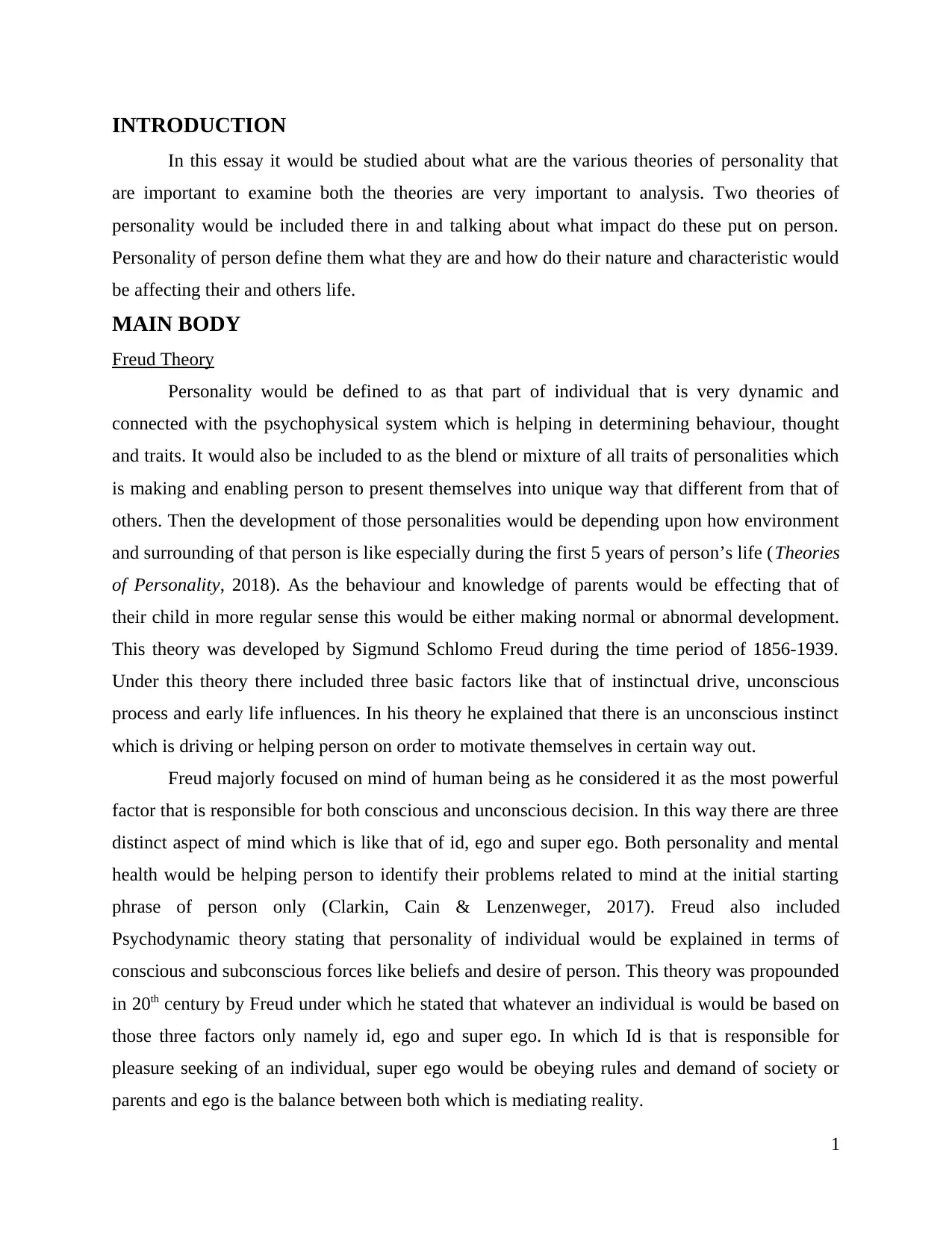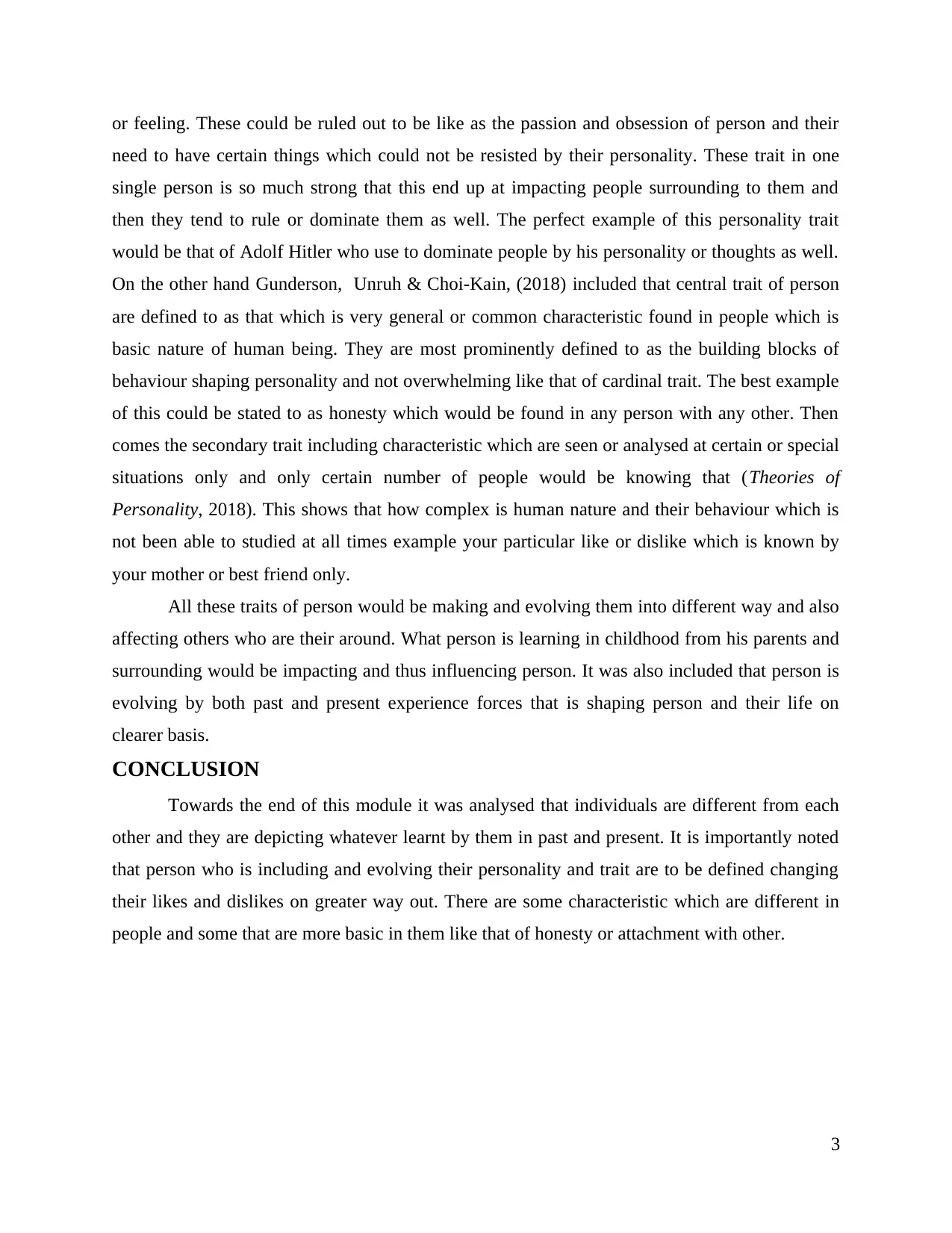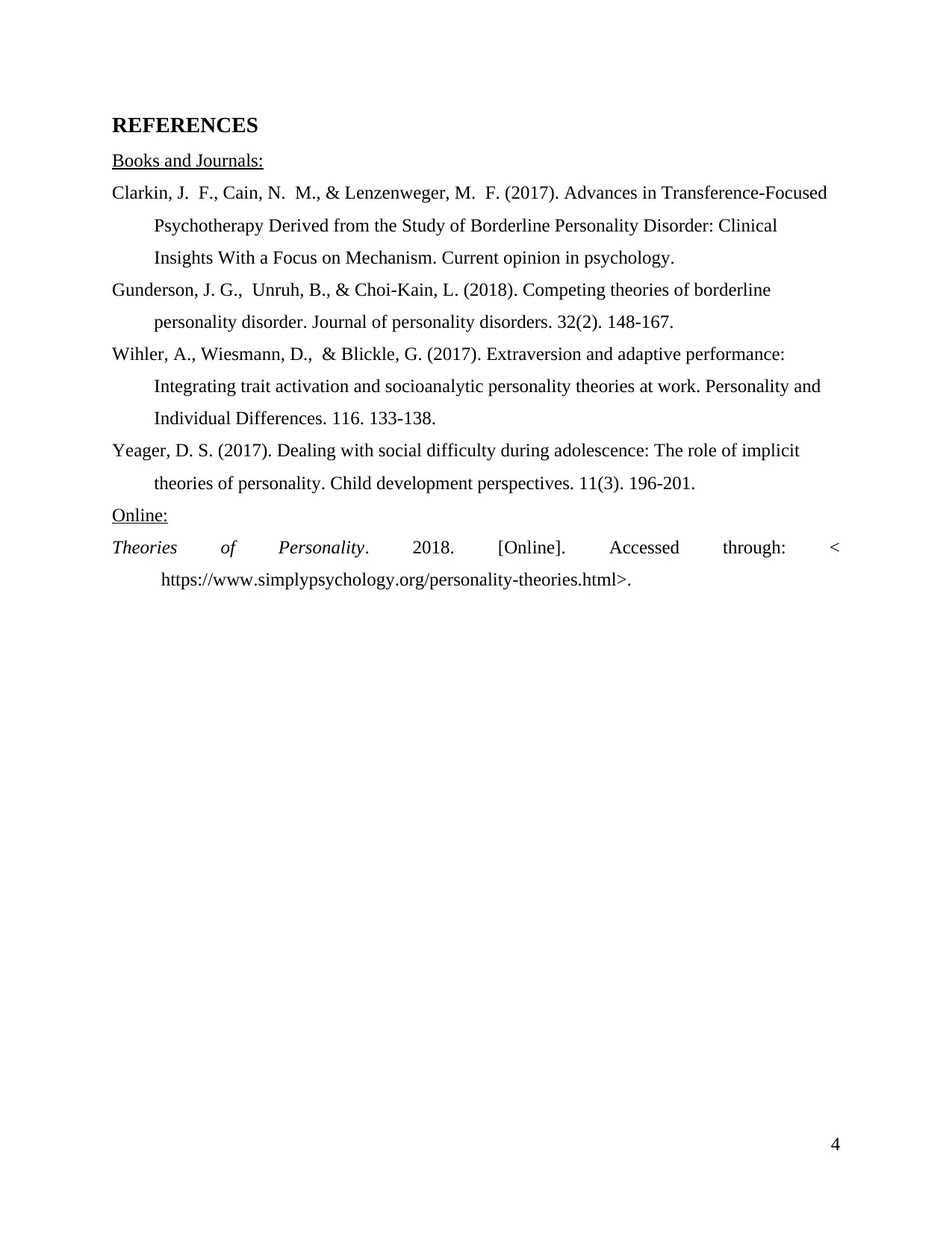An Analysis of Personality Theories: Freud vs. Allport's Approach
VerifiedAdded on 2020/12/18
|6
|1513
|363
Essay
AI Summary
This essay provides a comparative analysis of two prominent personality theories: Sigmund Freud's psychodynamic theory and Gordon Allport's trait theory. The essay begins by outlining Freud's theory, focusing on the concepts of the id, ego, and superego, as well as the influence of early life experiences on personality development. It also touches upon the psychodynamic theory and its emphasis on conscious and subconscious forces. The essay then transitions to Allport's trait theory, highlighting the uniqueness of individuals and the importance of traits in shaping personality. It delves into the three levels of traits: cardinal, central, and secondary, and discusses how these traits influence behavior and development. The conclusion emphasizes the differences between individuals and the impact of past and present experiences on personality, including the evolving nature of likes, dislikes, and the basic human traits. The essay references several academic sources to support its arguments.

ESSAY
Paraphrase This Document
Need a fresh take? Get an instant paraphrase of this document with our AI Paraphraser

Contents
INTRODUCTION...........................................................................................................................1
MAIN BODY..................................................................................................................................1
Freud Theory...............................................................................................................................1
Allport trait theory.......................................................................................................................2
CONCLUSION................................................................................................................................3
REFERENCES................................................................................................................................4
INTRODUCTION...........................................................................................................................1
MAIN BODY..................................................................................................................................1
Freud Theory...............................................................................................................................1
Allport trait theory.......................................................................................................................2
CONCLUSION................................................................................................................................3
REFERENCES................................................................................................................................4

INTRODUCTION
In this essay it would be studied about what are the various theories of personality that
are important to examine both the theories are very important to analysis. Two theories of
personality would be included there in and talking about what impact do these put on person.
Personality of person define them what they are and how do their nature and characteristic would
be affecting their and others life.
MAIN BODY
Freud Theory
Personality would be defined to as that part of individual that is very dynamic and
connected with the psychophysical system which is helping in determining behaviour, thought
and traits. It would also be included to as the blend or mixture of all traits of personalities which
is making and enabling person to present themselves into unique way that different from that of
others. Then the development of those personalities would be depending upon how environment
and surrounding of that person is like especially during the first 5 years of person’s life (Theories
of Personality, 2018). As the behaviour and knowledge of parents would be effecting that of
their child in more regular sense this would be either making normal or abnormal development.
This theory was developed by Sigmund Schlomo Freud during the time period of 1856-1939.
Under this theory there included three basic factors like that of instinctual drive, unconscious
process and early life influences. In his theory he explained that there is an unconscious instinct
which is driving or helping person on order to motivate themselves in certain way out.
Freud majorly focused on mind of human being as he considered it as the most powerful
factor that is responsible for both conscious and unconscious decision. In this way there are three
distinct aspect of mind which is like that of id, ego and super ego. Both personality and mental
health would be helping person to identify their problems related to mind at the initial starting
phrase of person only (Clarkin, Cain & Lenzenweger, 2017). Freud also included
Psychodynamic theory stating that personality of individual would be explained in terms of
conscious and subconscious forces like beliefs and desire of person. This theory was propounded
in 20th century by Freud under which he stated that whatever an individual is would be based on
those three factors only namely id, ego and super ego. In which Id is that is responsible for
pleasure seeking of an individual, super ego would be obeying rules and demand of society or
parents and ego is the balance between both which is mediating reality.
1
In this essay it would be studied about what are the various theories of personality that
are important to examine both the theories are very important to analysis. Two theories of
personality would be included there in and talking about what impact do these put on person.
Personality of person define them what they are and how do their nature and characteristic would
be affecting their and others life.
MAIN BODY
Freud Theory
Personality would be defined to as that part of individual that is very dynamic and
connected with the psychophysical system which is helping in determining behaviour, thought
and traits. It would also be included to as the blend or mixture of all traits of personalities which
is making and enabling person to present themselves into unique way that different from that of
others. Then the development of those personalities would be depending upon how environment
and surrounding of that person is like especially during the first 5 years of person’s life (Theories
of Personality, 2018). As the behaviour and knowledge of parents would be effecting that of
their child in more regular sense this would be either making normal or abnormal development.
This theory was developed by Sigmund Schlomo Freud during the time period of 1856-1939.
Under this theory there included three basic factors like that of instinctual drive, unconscious
process and early life influences. In his theory he explained that there is an unconscious instinct
which is driving or helping person on order to motivate themselves in certain way out.
Freud majorly focused on mind of human being as he considered it as the most powerful
factor that is responsible for both conscious and unconscious decision. In this way there are three
distinct aspect of mind which is like that of id, ego and super ego. Both personality and mental
health would be helping person to identify their problems related to mind at the initial starting
phrase of person only (Clarkin, Cain & Lenzenweger, 2017). Freud also included
Psychodynamic theory stating that personality of individual would be explained in terms of
conscious and subconscious forces like beliefs and desire of person. This theory was propounded
in 20th century by Freud under which he stated that whatever an individual is would be based on
those three factors only namely id, ego and super ego. In which Id is that is responsible for
pleasure seeking of an individual, super ego would be obeying rules and demand of society or
parents and ego is the balance between both which is mediating reality.
1
⊘ This is a preview!⊘
Do you want full access?
Subscribe today to unlock all pages.

Trusted by 1+ million students worldwide

This type of theory according to Gunderson, Unruh & Choi-Kain, (2018) focus on how
childhood of person is shaping personality of individual especially their experience. This
particular theory would be also taken as therapy which is attempting to reveal what are the
thoughts, desire and experience into unconscious mind of person. Id of person which is stated in
this particular theory is basically dealing with inherited like biological elements of human
including sex life and aggressive instinct which is death. As per Wihler, Wiesmann & Blickle,
(2017) this would be operating under principle of pleasure meaning that all desire of human
should be immediately fulfilled irrespective of what would be the consequence of that. While
ego is acting as the connective linkage between what is real and what mind is instructing or
wanting from person and then this takes full and final decision of personality component. At last
super ego would be dominated by what society and parents of person is wanting and then they
would be working according to that only.
Allport trait theory
This theory was developed by as American psychologist namely Gordon Willard Allport
and was first psychologist who studied personality into his research work. In his theory he
mainly focused on uniqueness of person and personality which is important in the present
context and rejecting all other theory stating psychoanalytic and behavioural as well. His theory
is named to as Allport’s trait theory which is describing the person and their characteristics as
well. Trait theory is having three distinct level including that of secondary, cardinal and central
trait of person. As this theory was first on its kind which lay stress on unique personality of
person linked with cognitive and motivation procedure and all of them are influencing
behaviours of person.’
All of them would be including like that of trait, skills, intelligence, habits, attitudes and
temperament. Thus the personality of person is there into since his birth and developing or
evolving throughout his experience or environment where he is living. According to Yeager,
(2017) trait would be defined to as that characteristic of person that is there into them since their
birth and could not be changed so easily. All the traits which person is having would be having
and believing to have into at the childhood of individual, experience and also current
environment.
The three traits which Allport included within his theory could be narrated to as cardinal
trait is that which is dominating personality of person and then strongly influencing their thought
2
childhood of person is shaping personality of individual especially their experience. This
particular theory would be also taken as therapy which is attempting to reveal what are the
thoughts, desire and experience into unconscious mind of person. Id of person which is stated in
this particular theory is basically dealing with inherited like biological elements of human
including sex life and aggressive instinct which is death. As per Wihler, Wiesmann & Blickle,
(2017) this would be operating under principle of pleasure meaning that all desire of human
should be immediately fulfilled irrespective of what would be the consequence of that. While
ego is acting as the connective linkage between what is real and what mind is instructing or
wanting from person and then this takes full and final decision of personality component. At last
super ego would be dominated by what society and parents of person is wanting and then they
would be working according to that only.
Allport trait theory
This theory was developed by as American psychologist namely Gordon Willard Allport
and was first psychologist who studied personality into his research work. In his theory he
mainly focused on uniqueness of person and personality which is important in the present
context and rejecting all other theory stating psychoanalytic and behavioural as well. His theory
is named to as Allport’s trait theory which is describing the person and their characteristics as
well. Trait theory is having three distinct level including that of secondary, cardinal and central
trait of person. As this theory was first on its kind which lay stress on unique personality of
person linked with cognitive and motivation procedure and all of them are influencing
behaviours of person.’
All of them would be including like that of trait, skills, intelligence, habits, attitudes and
temperament. Thus the personality of person is there into since his birth and developing or
evolving throughout his experience or environment where he is living. According to Yeager,
(2017) trait would be defined to as that characteristic of person that is there into them since their
birth and could not be changed so easily. All the traits which person is having would be having
and believing to have into at the childhood of individual, experience and also current
environment.
The three traits which Allport included within his theory could be narrated to as cardinal
trait is that which is dominating personality of person and then strongly influencing their thought
2
Paraphrase This Document
Need a fresh take? Get an instant paraphrase of this document with our AI Paraphraser

or feeling. These could be ruled out to be like as the passion and obsession of person and their
need to have certain things which could not be resisted by their personality. These trait in one
single person is so much strong that this end up at impacting people surrounding to them and
then they tend to rule or dominate them as well. The perfect example of this personality trait
would be that of Adolf Hitler who use to dominate people by his personality or thoughts as well.
On the other hand Gunderson, Unruh & Choi-Kain, (2018) included that central trait of person
are defined to as that which is very general or common characteristic found in people which is
basic nature of human being. They are most prominently defined to as the building blocks of
behaviour shaping personality and not overwhelming like that of cardinal trait. The best example
of this could be stated to as honesty which would be found in any person with any other. Then
comes the secondary trait including characteristic which are seen or analysed at certain or special
situations only and only certain number of people would be knowing that (Theories of
Personality, 2018). This shows that how complex is human nature and their behaviour which is
not been able to studied at all times example your particular like or dislike which is known by
your mother or best friend only.
All these traits of person would be making and evolving them into different way and also
affecting others who are their around. What person is learning in childhood from his parents and
surrounding would be impacting and thus influencing person. It was also included that person is
evolving by both past and present experience forces that is shaping person and their life on
clearer basis.
CONCLUSION
Towards the end of this module it was analysed that individuals are different from each
other and they are depicting whatever learnt by them in past and present. It is importantly noted
that person who is including and evolving their personality and trait are to be defined changing
their likes and dislikes on greater way out. There are some characteristic which are different in
people and some that are more basic in them like that of honesty or attachment with other.
3
need to have certain things which could not be resisted by their personality. These trait in one
single person is so much strong that this end up at impacting people surrounding to them and
then they tend to rule or dominate them as well. The perfect example of this personality trait
would be that of Adolf Hitler who use to dominate people by his personality or thoughts as well.
On the other hand Gunderson, Unruh & Choi-Kain, (2018) included that central trait of person
are defined to as that which is very general or common characteristic found in people which is
basic nature of human being. They are most prominently defined to as the building blocks of
behaviour shaping personality and not overwhelming like that of cardinal trait. The best example
of this could be stated to as honesty which would be found in any person with any other. Then
comes the secondary trait including characteristic which are seen or analysed at certain or special
situations only and only certain number of people would be knowing that (Theories of
Personality, 2018). This shows that how complex is human nature and their behaviour which is
not been able to studied at all times example your particular like or dislike which is known by
your mother or best friend only.
All these traits of person would be making and evolving them into different way and also
affecting others who are their around. What person is learning in childhood from his parents and
surrounding would be impacting and thus influencing person. It was also included that person is
evolving by both past and present experience forces that is shaping person and their life on
clearer basis.
CONCLUSION
Towards the end of this module it was analysed that individuals are different from each
other and they are depicting whatever learnt by them in past and present. It is importantly noted
that person who is including and evolving their personality and trait are to be defined changing
their likes and dislikes on greater way out. There are some characteristic which are different in
people and some that are more basic in them like that of honesty or attachment with other.
3

REFERENCES
Books and Journals:
Clarkin, J. F., Cain, N. M., & Lenzenweger, M. F. (2017). Advances in Transference-Focused
Psychotherapy Derived from the Study of Borderline Personality Disorder: Clinical
Insights With a Focus on Mechanism. Current opinion in psychology.
Gunderson, J. G., Unruh, B., & Choi-Kain, L. (2018). Competing theories of borderline
personality disorder. Journal of personality disorders. 32(2). 148-167.
Wihler, A., Wiesmann, D., & Blickle, G. (2017). Extraversion and adaptive performance:
Integrating trait activation and socioanalytic personality theories at work. Personality and
Individual Differences. 116. 133-138.
Yeager, D. S. (2017). Dealing with social difficulty during adolescence: The role of implicit
theories of personality. Child development perspectives. 11(3). 196-201.
Online:
Theories of Personality. 2018. [Online]. Accessed through: <
https://www.simplypsychology.org/personality-theories.html>.
4
Books and Journals:
Clarkin, J. F., Cain, N. M., & Lenzenweger, M. F. (2017). Advances in Transference-Focused
Psychotherapy Derived from the Study of Borderline Personality Disorder: Clinical
Insights With a Focus on Mechanism. Current opinion in psychology.
Gunderson, J. G., Unruh, B., & Choi-Kain, L. (2018). Competing theories of borderline
personality disorder. Journal of personality disorders. 32(2). 148-167.
Wihler, A., Wiesmann, D., & Blickle, G. (2017). Extraversion and adaptive performance:
Integrating trait activation and socioanalytic personality theories at work. Personality and
Individual Differences. 116. 133-138.
Yeager, D. S. (2017). Dealing with social difficulty during adolescence: The role of implicit
theories of personality. Child development perspectives. 11(3). 196-201.
Online:
Theories of Personality. 2018. [Online]. Accessed through: <
https://www.simplypsychology.org/personality-theories.html>.
4
⊘ This is a preview!⊘
Do you want full access?
Subscribe today to unlock all pages.

Trusted by 1+ million students worldwide
1 out of 6
Related Documents
Your All-in-One AI-Powered Toolkit for Academic Success.
+13062052269
info@desklib.com
Available 24*7 on WhatsApp / Email
![[object Object]](/_next/static/media/star-bottom.7253800d.svg)
Unlock your academic potential
Copyright © 2020–2026 A2Z Services. All Rights Reserved. Developed and managed by ZUCOL.





